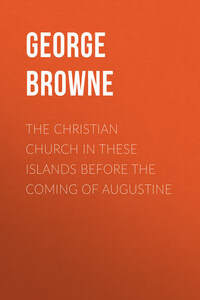Importance of the anniversaries connected with the years 1894-1897. – Christianity in Kent immediately before Augustine. – Dates of Bishop Luidhard and Queen Bertha. – Romano-British Churches in Canterbury. – Who were the Britons. – Traditional origin of British Christianity. – St. Paul. – Joseph of Arimathea. – Glastonbury. – Roman references to Britain.
We are approaching an anniversary of the highest interest to all English people: to English Churchmen first, for it is the thirteen-hundredth anniversary of the planting of the Church of England; but also to all who are proud of English civilisation, for the planting of a Christian Church is the surest means of civilisation, and English civilisation owes everything to the English Church. In 1897 those who are still here will celebrate the thirteen-hundredth anniversary of the conversion of Ethelbert, king of the Kentish people, by Augustine and the band of missionaries sent by our great benefactor Gregory, the sixty-fourth bishop of Rome. I am sorry that the limitation of my present subject prevents me from enlarging upon the merits of that great man, and upon our debt to him. Englishmen must always remember that it was Gregory who gave to the Italian Mission whatever force it had; it was Gregory who gave it courage, when the dangers of a journey through France were sufficient to keep it for months shivering with fear under the shadow of the Alps; it was Gregory who gave it such measure of wisdom and common sense as it had, qualities which its leader sadly lacked. Coming nearer to the present year, there will be in 1896 the final departure of Augustine from Rome to commemorate, on July 23, and his arrival here in the late autumn. In 1895 there will be to commemorate the first departure from Rome of Augustine and his Mission, by way of Lérins and Marseilles to Aix, and the return of Augustine to Rome, when his companions, in fear of the dangers of the way, refused to go further. An ill-omened beginning, prophetic and prolific of like results. The history of the Italian Mission is a history of failure to face danger. Mellitus fled from London, and got himself safe to Gaul; Justus fled from Rochester, and got himself safe to Gaul; Laurentius was packed up to fly from Canterbury and follow them1; Paulinus fled from York. In 1894 we have, as I believe, to commemorate the final abandonment of earlier and independent plans for the conversion of the English in Kent, from which abandonment the Mission of Augustine came to be.
It is a very interesting fact that just when we are preparing to commemorate the thirteen-hundredth anniversary of the introduction of Christianity into England, and are drawing special attention to the fact that Christianity had existed in this island, among the Britons, for at least four hundred years before its introduction to the English, our neighbours in France are similarly engaged. They are preparing to celebrate in 1896 the fourteen-hundredth anniversary of “the introduction of Christianity into France,” as the newspapers put it. This means that in 496, Clovis, king of the Franks, became a Christian; as, in 597, Ethelbert, king of the Kentish-men, became a Christian2. As we have to keep very clear in our minds the distinction between the introduction of Christianity among the English, from whom the country is called England, and its introduction long before into Britain; so our continental neighbours have to keep very clear the difference between the introduction of Christianity among the Franks, from whom the country is called France, and its introduction long before into Gaul. The Archbishop of Rheims, whose predecessor Remigius baptized Clovis in 496, is arranging a solemn celebration of their great anniversary; and the Pope has accorded a six months’ jubilee in honour of the occasion. No doubt the Archbishop of Canterbury, whose predecessor Augustine baptized Ethelbert, will in like manner make arrangements for a solemn celebration of our great anniversary. It would be an interesting and fitting thing, to hold a thanksgiving service within the walls of Richborough, which is generally accepted as the scene of Augustine’s first interview with King Ethelbert, and has now been secured and put into the hands of trustees3. The two commemorations, at Rheims and at Canterbury, are linked together in a special way by the fact that Clotilde, the Christian wife of Clovis, was the great-grandmother of Bertha, the Christian wife of Ethelbert.
In the year 594, two years before the arrival of Augustine, there was, and I believe had long been, a Christian queen in pagan Kent; there was, and I believe had long been, a Christian bishop in pagan Canterbury, sent there to minister to the Christian queen. An excellent opening this for the conversion of the king and people, an opening intentionally created by those who made the marriage on the queen’s side. But, however hopeful the opening, the immediate result was disappointing. If more of missionary help had been sent from Gaul, from whence this bishop came, the conversion of the king and people might have come in the natural way, by an inflow of Christianity from the neighbouring country. But such help, though pressingly asked for, was not given; and as I read such signs as there are, this year 594, of which we now inaugurate the thirteen-hundredth anniversary, was the year in which it came home to those chiefly concerned that the conversion was not to be effected by the means adopted. Beyond some very limited area of Christianity, only the queen and some few of her people, and the religious services maintained for them, the bishop’s work was to be barren. The limited work which he did was that for which ostensibly he had come; but I think we are meant to understand that his Christian ambition was larger than this, his Christian hope higher. I shall make no apology for dwelling a little upon the circumstances of this Christian work, immediately before the coming of Augustine. It may seem a little discursive; but it forms, I think, a convenient introduction to our general subject.








